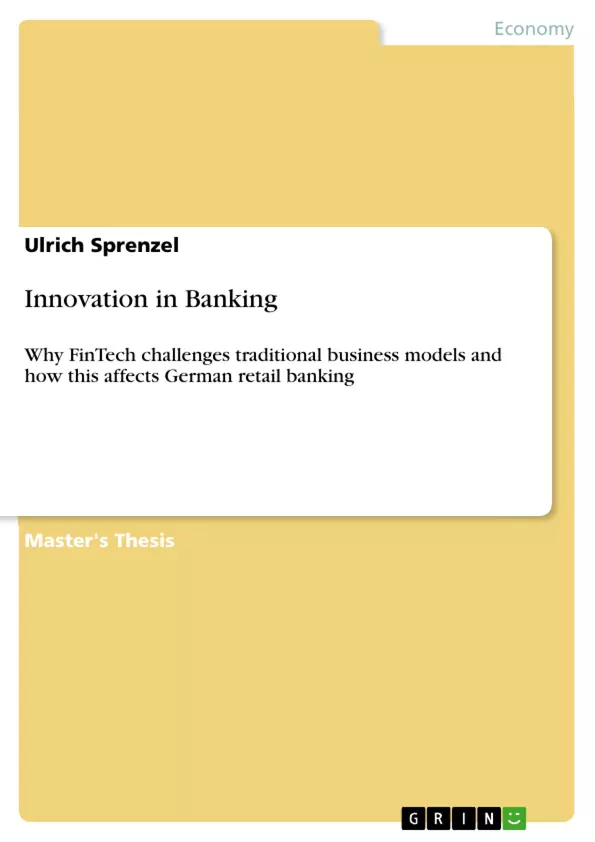The impact of the financial crisis was a challenge for international and German banks and a test for the robustness of their business models. The consequences were stricter financial regulations introduced by Basel III and banks were forced to reduce proprietary trading and to refocus on traditional core banking business. Today supervisory authorities require sufficient and appropriate risk management systems to ensure financial stability and thus the internal operational complexity has increased and generates additional costs. In the aftermath of the financial crisis some banks are still struggling to regain competitiveness in combination with diminishing margins. In particular those banks are challenged with high dependency from interest income by deposit-financed retail banking business.
In recent years financial technology companies, commonly known as FinTech, gained more importance in the financial industry and challenge banks and established business models. Digitisation is advancing in all industries and the music and media industry has already experienced a painful transformation process and a similar development is expected as well for the financial industry. Depending on how revolutionary the technological innovation is the more intense will be the impact on business models and in consequence fast adaptability is essential. The level of activity within FinTech is enormous at the moment in Germany and over one hundred new companies were launched in 2014. As a consequence digital business models are analysed with respect to core competences and how FinTech generates benefits for customers by improving the value with innovative digital solutions.
Inhaltsverzeichnis (Table of Contents)
- 1 Introduction
- 1.1 Abstract
- 1.2 Research Method and Questions
- 1.3 Boundary and Limitation of the Study
- 2 Banking
- 2.1 Definition of Banking
- 2.2 German Banking System
- 2.3 Effects of the Financial Crisis
- 2.4 Retail Banking in Germany
- 2.5 Challenges in the current Market Environment
- 3 Financial Technology
- 3.1 Impact of Digitisation
- 3.2 Definition of FinTech
- 3.3 Impact of FinTech
- 3.4 FinTech Market in Germany
- 3.5 FinTech Business Models
- 3.5.1 Digital Payment Business Model
- 3.5.2 Digital Investment and Savings Business Models
- 3.5.3 Digital Lending Business Models
- 3.6 FinTech Business Models versus Traditional Banking Business Models
- 3.7 Impact of Licenses and Regulation on FinTech Business Models
- 4 Research Study and Assessment
- 4.1 Research Study
- 4.1.1 Objectives
- 4.1.2 Participants
- 4.2 Assessment of the Study
- 4.2.1 FinTech
- 4.2.2 German Banking Industry
- 4.2.3 Strategic Alignment and Outlook
- 4.3 Strategic Options for the German Banking Industry
- 4.1 Research Study
- 5 Conclusion
- 5.1 Summary of Results
- 5.2 Outlook and Future Research
Zielsetzung und Themenschwerpunkte (Objectives and Key Themes)
This research study aims to analyze the impact of FinTech on the German retail banking industry. It investigates how FinTech companies challenge traditional banking business models and what this means for the future of German retail banking. The study explores the potential for collaboration between FinTech companies and traditional banks, and it provides insights into the strategic options available to German banks in the face of this disruption.
- The impact of FinTech on the German retail banking industry
- Challenges to traditional banking business models
- The potential for collaboration between FinTech companies and traditional banks
- Strategic options for German banks in the face of disruption
- The future of German retail banking
Zusammenfassung der Kapitel (Chapter Summaries)
Chapter 1 introduces the research study and outlines its scope, methodology, and key research questions. It also discusses the limitations of the study.
Chapter 2 provides a comprehensive overview of the banking sector, focusing on the German banking system and the challenges it faces in the current market environment.
Chapter 3 delves into the world of financial technology, exploring the impact of digitization and defining the concept of FinTech. It analyzes the FinTech market in Germany, examines different FinTech business models, and compares them to traditional banking models. The chapter also discusses the impact of licenses and regulations on FinTech businesses.
Chapter 4 presents the results of the research study, examining the impact of FinTech on the German banking industry and identifying strategic options for banks. It assesses the strategic alignment and outlook for the German banking sector.
Schlüsselwörter (Keywords)
The main keywords and focus topics of this work include FinTech, retail banking, German banking system, innovation, business models, digitalization, disruption, strategic options, collaboration, and future of banking.
Frequently Asked Questions
How is FinTech challenging traditional banking in Germany?
FinTech companies use innovative digital solutions to improve customer value in areas like payments, lending, and investments, forcing traditional banks to adapt their established business models.
What were the effects of the financial crisis on banking?
The crisis led to stricter regulations like Basel III, requiring banks to hold more capital and improve risk management, which increased operational complexity and costs.
What are the main FinTech business models?
The study categorizes them into digital payment models, digital investment/savings models, and digital lending models (such as peer-to-peer lending).
Can traditional banks and FinTechs collaborate?
Yes, collaboration is a key strategic option. Banks can offer their regulatory licenses and customer base, while FinTechs provide the technological innovation and agility.
Why is digitalization a "painful transformation" for banks?
Similar to the media industry, digitalization disrupts core revenue streams like interest income and requires a complete overhaul of internal processes and customer interaction.
- Quote paper
- Ulrich Sprenzel (Author), 2015, Innovation in Banking, Munich, GRIN Verlag, https://www.grin.com/document/315454



